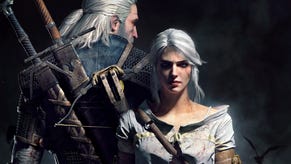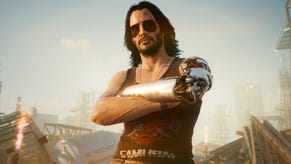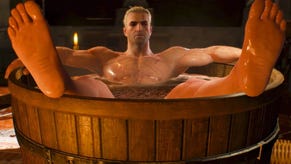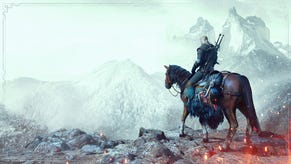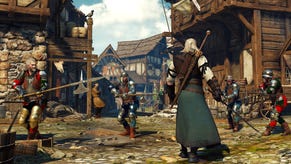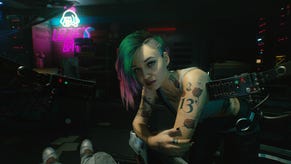The RPG Scrollbars: A Witcher's Worthy Foes
The monster mash
Note - some of the below images may constitute spoilers, if you've avoided most of the trailers and whatnot.
Guess what I'm playing at the moment! [The Witcher 3? --Obviousness Ed] I'm actually feeling a touch trapped by it, caught between the need to get a review out and my enjoyment of just ambling around and doing Witcher stuff rather than barreling down the core path. It's coming though! It's coming as soon as I can, and you can probably tell that it's going to be quite positive without the need for any fancy Witcher senses. One of the many things I'm appreciating about it though is something I've long found frustratingly missing from RPGs. I'm talking about respect - not for players, but for the monsters.
As with many parts of the genre, I think it's something where your opinion depends on what brought you into it. D&D for instance has its roots in war-games, a focus that the likes of Game of Thrones and Lord of the Rings have been happy to embrace. Armies clashing! A thousand swords striking a thousand shields! Computer RPGs meanwhile are essentially a murder production line most of the time. By the time you reach the end, you've murdered entire nations of monsters and thugs who did admittedly probably deserve it, but still. At some point you shouldn't get a level-up, but PTSD.
The fantasy that I grew up loving though tended to follow very different paths, and a big part of that is the monsters - the horrors of folk and fairy tales, the singular threats. The Hobbit for instance, where the mere idea of killing Smaug was so inherently laughable that a team of battle-loving dwarves opted to take the subtle approach and hire a burglar. The original versions of tales like Red Riding Hood, prior to convenient huntsmen showing up, where the threats had to be mighty in order to tell a fable. "But mommy, why couldn't Red Riding Hood just kick it in the balls and run away?" didn't cut it.
In The Witcher [official site], which of course draws a lot of inspiration from fairy tales both implicitly and explicitly, one of the things that makes Geralt interesting is that he comes to things from the other direction. I'm speaking only of the games here, though I've read a couple of the books. He's a monster hunter, but in both knowing them so well and being arguably as much on their side of the social divide as he is in the human world, he has a respect for them that really works for me. As seen in The Witcher 2, he'll kill a dragon, but it's a matter for sadness rather than celebration - a great beast brought low, even while being ignorant of its true story. In The Witcher 3, his stoic stance and practiced neutrality are every bit as likely to break in the face of a 'monster' like a botchling (a stillborn baby risen as something else) or a mischievous godling as anything else. It's generally up to the player whether or not he extends this shit-giving to quest completion or not, but time and again he makes it clear that if a monster isn't causing enough trouble to warrant a contract on its head, he's not particularly bothered about its presence.
As usual, one of the most important parts of the story is how it begins, with the griffin. It's a monster, it's attacking the locals, it needs slaying. But still, we find out that it has reason beyond 'it's a monster' - the death of its mate, which is treated with the forensic care that we later get when Geralt examines a human corpse. It doesn't stop him taking the contract, it doesn't even play a part in how it's stopped, and he doesn't bring anyone their comeuppance. It's just part of the tapestry, to be discarded or appreciated as each individual player sees fit.
But respect doesn't just come from sympathy, empathy or moralising. Ignoring Geralt's own feelings, one of my favourite things about The Witcher as a series is that it respects its monsters as monsters. Yes, there are many that are just pests, like drowners and nekkers, that pretty much any mob could deal with. When scaled up even a little though, it presents a world where the monsters are actually threats in a way that most RPG foes just aren't. Geralt is almost a hundred years old by this point, and yet even for something he treats as by-the-book as a griffin fight or a werewolf, he has to prepare for the fight - to think, to make plans, to bring in additional help. The nature of The Witcher's combat does mean this kinda diminishes after a while as the hack and slash approach becomes easier, but early on it sets an interesting dynamic - that as much as Geralt's sword fighting is beyond the average man in every way, it's what's in his head that really counts. We also see this with Ciri in the tutorial of course, that witcher training is as much about reading boring books about the difference between ghouls and alghouls (the difference of course being that one is the undead remnants of a corpse, and the other the undead remnants of the man who invented the Internet).
Well. Usually they show respect, anyway...
One of the sad things about RPGs though is that to extend this across a full game would be an incredibly tough sell. We're so used to killing monsters in their thousands that it takes something really special to stand out, and it's a rare monster that can be on such a higher level that "just smack it with a sword" doesn't inherently feel appropriate. Dragons are about the only species with the majesty to get away with it, with literal forces of evil or otherworldly menace on about the same tier. Even then, games typically make things far easier than they should. As I joked after playing Mortal Kombat X, the answer to "What makes you think you can defeat a god?!" is "Your health bar."
To actually crank this up more than The Witcher already does feels like one of those ideas that sounds better than it actually is. RPGs have increasingly become games of efficiencies, especially post-MMOs where people obsess over numbers like their DPS and gear score. They're games of power and momentum, and having that stop for the sake of finding wolfbane to deal with a werewolf or else have your sword bounce off its invulnerable skin as it kills you... that's not generally what people are looking for. Perhaps it's fun to do once or twice, as the Quest for Glory series showed (helped by being more adventure than RPG anyway, so fitting as a 'puzzle'), but after a while it gets old. It's very quickly just going to be an obstacle between you and those delicious XP points, especially midway through the game when the initial novelty has worn off.
The simple wrapping of it counts for a lot though, setting the tone in so many ways - Geralt's own responses, the long introspective scenes where he and Ciri will just sit by a body and calmly discuss how horrific the death was rather than leaving it as just a standard 'out of hit points' affair, and the ways that the tiers of monsters are discussed. When Geralt has visible trouble fighting a griffin, even as just a tutorial, it makes it all the more meaningful when he flat out says that fighting three mysterious swamp crones (evil Fates, essentially) would be suicide. The same thing doesn't work if you simply give an enemy a health-bar or claim it's a badass - showing not telling begins long before you even see the foe, with the details that ensure that what you show is meaningful.
Not every enemy needs that treatment. It's fine to just have sword-fodder. But sometimes, it's definitely nice to have one that feels like it made more impact on the world than moving into a random cave and waiting to be slain. See also the likes of Miyazaki's Undead Dragon in Dark Souls - a maggoty horror sent back to the artist with "This isn't dignified. Can't you instead try to convey the deep sorrow of a magnificent beast doomed to a slow and possibly endless descent into ruin?" These are the monsters we deserve, that almost make you feel bad about calling them that.
A little, at least. Sometimes, almost certainly.
Before you kill the crap out of them, because they have loot.






